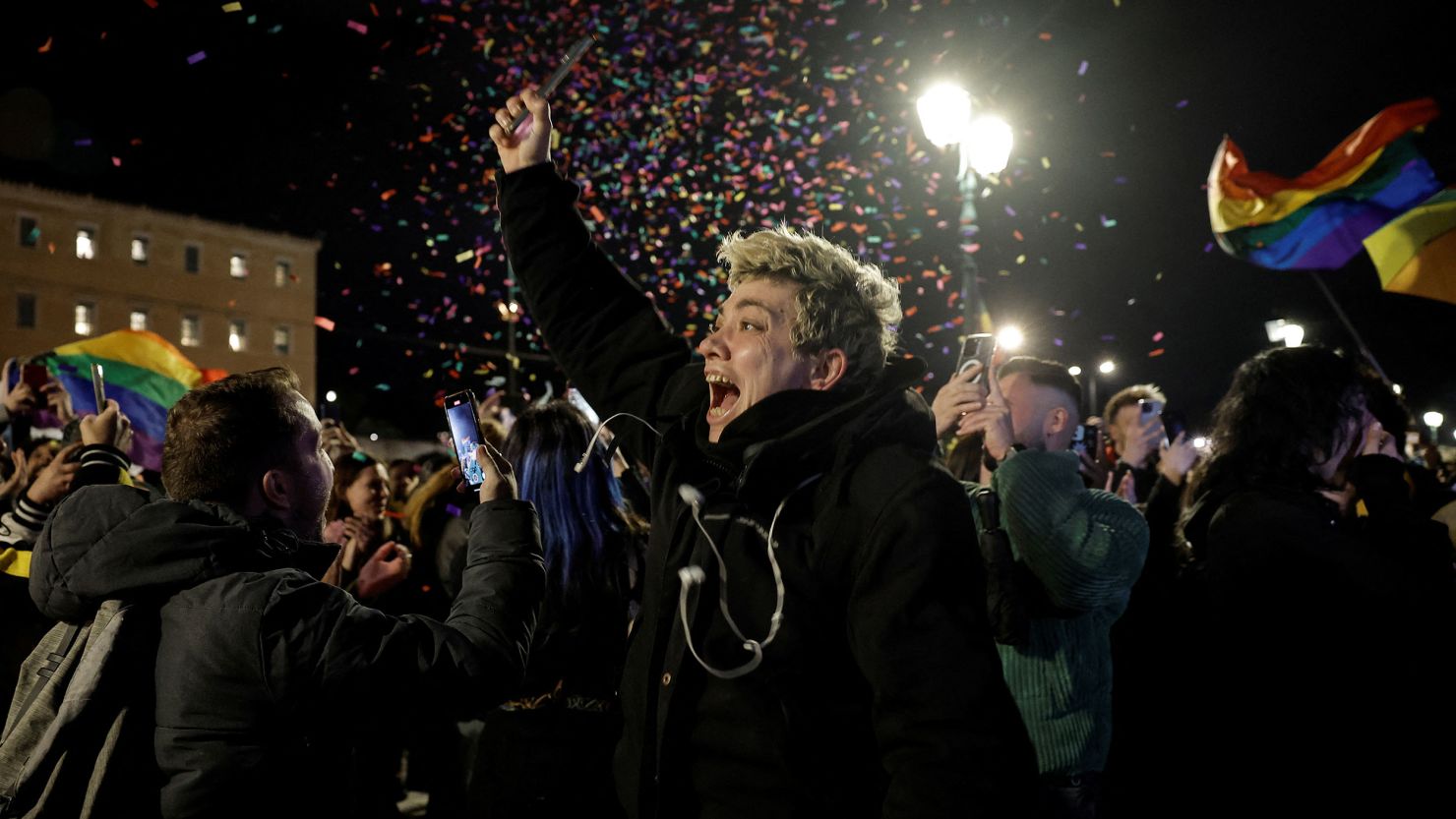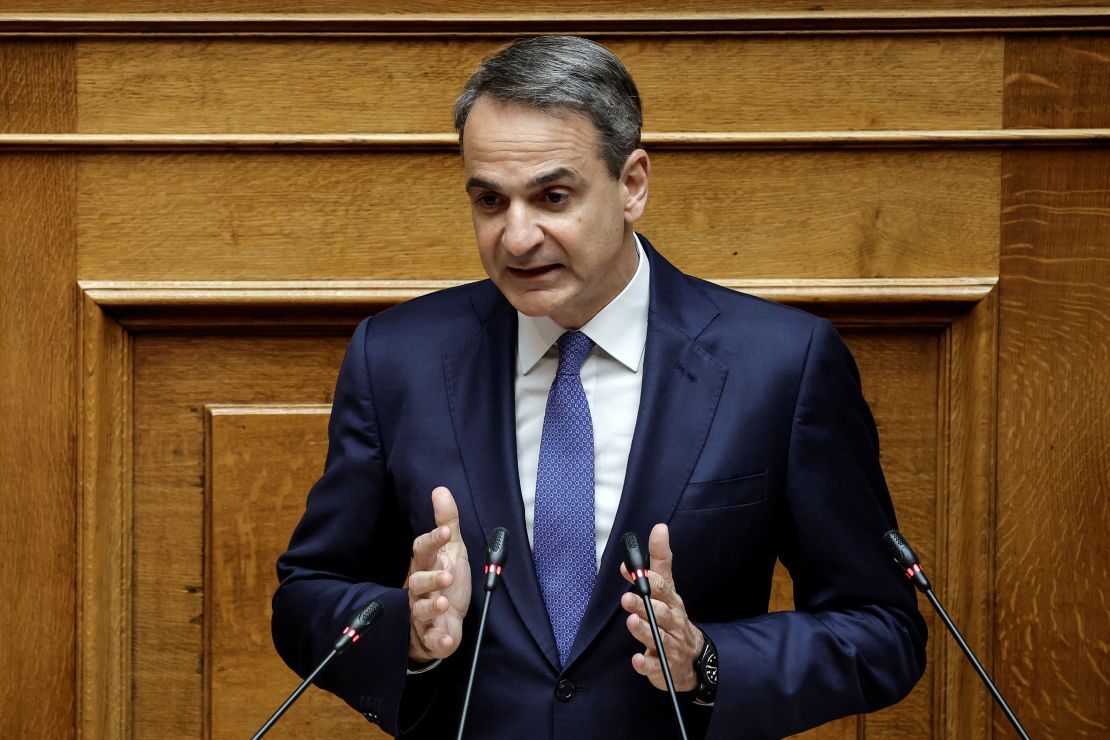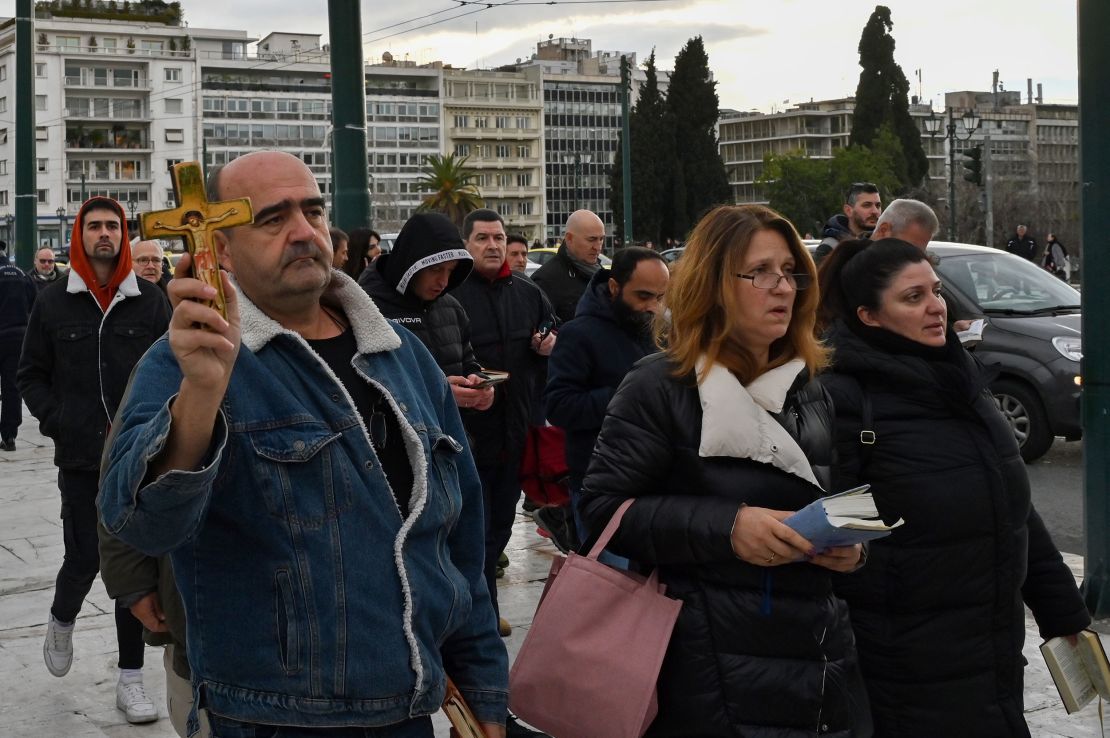
Members of the LGBTQ+ community and supporters celebrate in front of the Greek parliament, after the vote in favor of a bill that approved allowing same-sex civil marriages, in Athens on February 15. Louisa Gouliamaki/ReutersAthens, GreeceCNN —
The Greek parliament on Thursday passed a law legalizing same-sex marriage, in a landmark victory for human rights in Greece and making it the first majority Orthodox Christian country to establish marriage equality for all.
The decision, supported by 176 out of 300 lawmakers in parliament and with 76 against, follows months of polarized political and public discourse, and has been welcomed as a long-awaited vindication by the country’s LGBTQ+ couples.
“This is a milestone for human rights, reflecting today’s Greece – a progressive, and democratic country, passionately committed to European values,” Greece’s Prime Minister Kyriakos Mitsotakis said in a post on X following the vote.
Andrea Gilbert a founding member of Athens Pride, now approaching its 20th year, told CNN: “We started as an invisible, marginalized community. We continued to vote. Paid our taxes. Campaigned. The legislation provides a legal basis to further build on. It is particularly significant for young couples.”
Parental and children’s rights are a cornerstone of the legislation, which will allow same-sex couples to adopt and receive full parental recognition.

Although Greece introduced civil partnerships for gay couples nearly a decade ago under the left-wing Syriza government, only the biological parents of children in those relationships were recognized as legal guardians. Now, same-sex parents can both be recognized as legal parents to their children.
“The new law will finally provide same-sex parents some peace of mind on fundamental issues including parental rights to a surviving parent in the event of their partner’s death,” said Katerina Trimmi, a member of the Greek National Commission of Human Rights and a lawyer from the organization Rainbow Families. She noted however that such parents will need to go through formal adoption procedures, saying that parental rights could have been established “in a simpler way.”
Same-sex couples can now also adopt in Greece, but not have a baby through a surrogate. Like in much of the EU, surrogacy remains a thorny issue and Greek Prime Minister Kyriakos Mitsotakis, who tabled the legislation as “a matter of equality,” clarified early on that this was not something he was willing to tackle. “The idea of women who are turned into child-producing machines on demand … that is not going to happen.”

Greek Prime Minister Kyriakos Mitsotakis speaks at parliament on February 15. Louisa Gouliamaki/Reuters
However the new legislation does recognize the status of existing offspring, including those adopted or born to surrogates abroad.
Outside Parliament in Athens on Thursdau, members of the LGBTQ+ community told CNN that they felt seen for the first time as lawmakers prepared to vote on the bill. Computer engineering student Sergio Berezovski, 20, described the vote as a “true historic moment,” adding that “I can actually go out, be myself and have the same rights as the rest of the people in society. I just feel seen – that’s the most important part.”
Divided society
The build-up to the vote has been an uphill battle with emotions running high. It was never going to be easy. In Greece the push came from a center-right party with many of its voters supporting traditional family values.
Fifteen of the European Union’s 27 members have already legalized same-sex marriage and Mitsotakis, empowered by a recent fresh mandate, stuck to his guns to see the bill through, signaling his intention for his government to be further aligned with the more progressive EU forces.
Polls show that Greek society at its core remains a country of traditional family values and structures, while it continues to lag other Western countries in issues of gender equality. In 2022, Athens placed last in the EU’s Gender Equality Index with only slight improvement in 2023.
A recent poll carried out by Metron Analysis showed that although 62% of respondents said they were in favor of same-sex marriage, 69% were against same-sex parenthood. Surveys directed exclusively at young respondents showed higher support rates.
The same-sex marriage bill has drawn the wrath of the influential Greek Orthodox Church to which more than 80% of the population belong.
In a letter addressed to all 300 of Greece’s parliamentarians ahead of the vote, the Church’s governing body said the bill places the rights of homosexual adults above the interests of future children, by allowing them “to be parented by same-sex couples and grow up without a father or mother in an environment of confusing gender roles.”

Greek-Orthodox people participated in a protest against the legislation on February 15 in Athens. Milos Bicanski/Getty Images
Senior bishops have threatened mobilizations. At a protest rally outside parliament, crucifix-holding protesters, including robed priests, joined far-right supporters in chanting: “Take your hands off our children.”
The center-right New Democracy government that sponsored the bill failed to garner the support of some of its own 158 politicians in the 300 seat parliament, requiring votes from center and left opposition parties for the legislation to pass.
IT student Alexis Rafailides, 21, said Thursday’s vote was important because there is “so much” discrimination against the community in Greece. “I didn’t feel like I could be myself for such a long time until I met more people that are like me,” he said.
Political boost
Days into his second term, empowered by a landslide election win which saw the centrist and center-left suffer catastrophic losses, Mitsotakis pledged his support for same-sex marriage legislation.
The rise of Stefanos Kasselakis, an openly gay Greek-American political unknown whose communication skills helped catapult him to the helm of Syriza, the main opposition party, in September, may have served as a political boost. “It felt to me like Mitsotakis was giving the progressive forces a carrot that he would use at a convenient time but without providing specifics,” Kasselakis said.
Accompanied by his longtime American partner Tyler McBeth throughout his campaign, Kasselakis kept his same-sex relationship in the Greek public eye.

RELATED ARTICLEFrance on-track to constitutionalize abortion rights
In October, the couple married in the US. Addressing Greek media at the time, Kasselakis stirred further controversy: “We would like to have two boys, Apollo and Elias… through a surrogate mother.”
He said the new law was a step in the right direction “I’ve been very fortunate. I have lived in very open societies. But not everyone in Greece has.”
Stelios Pandazopoulos, 48, told CNN he had never considered marriage, “because I never had the opportunity. I was not allowed to think about it. It was a right for other people.” The vote is the “first time I feel a little bit more complete, a little bit more human, a little bit more equal,” the architect added.
Freedom to dream
The political timing is significant beyond Greece’s borders. The legislation brings the country in line with 20 other European nations and strengthens its human rights credentials ahead of upcoming European elections. It also helps distance the ruling party from recent allegations of wiretapping opponents, migrant pushbacks and a media freedom backslide. Greece came last among EU countries in Reporters Without Borders 2023 World Press Freedom Index.
Yet there is a political risk. The last Greek elections saw the far right surge, with three fringe parties entering parliament. Together they hold a bloc of more than 30 seats. All three voted against the same-sex marriage law, and the legislation could still push some angry voters to the right ahead of European elections in June.
For activists and members of the LGBTQ+ community like 24-year-old Angelo, who left his village near the agricultural town of Karditsa to live with his boyfriend in Athens and who https://ikutisaja.com declined to give his last name “to make sure his family does not find out,” a battle in their birthplace – the birthplace of democracy – has been won.